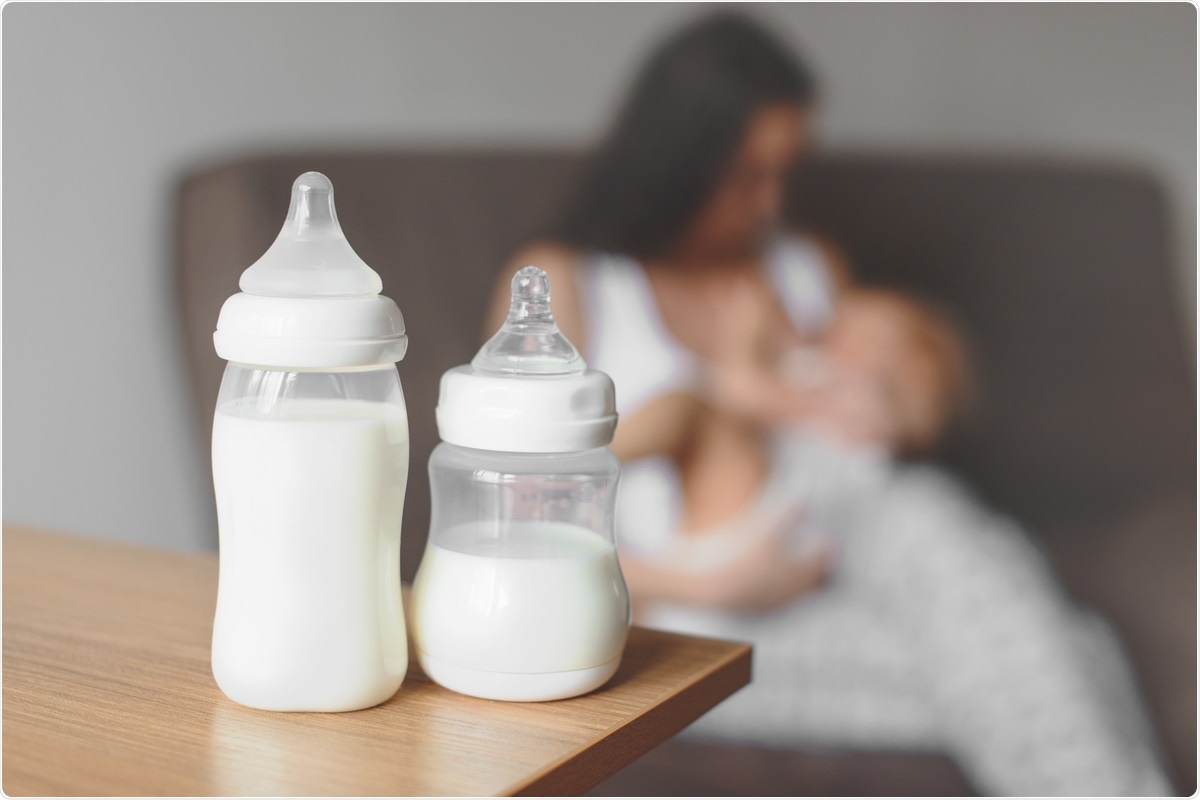As vaccines against the severe acute respiratory syndrome coronavirus 2 (SARS-CoV-2) virus are being rolled out in many nations around the world, the evidence is slowly accumulating that the immunization of pregnant and lactating mothers may contribute to passive immunity in the newborn.
A new preprint on the medRxiv* server adds to the sum of knowledge around this issue, showing highly synchronized and rapid development of an antibody response in breast milk and serum, which reached stable levels around two weeks after the second dose of the vaccine was administered.

Observations in a lactating cohort in Israel
The COVID-19 vaccination campaign in Israel began in December 2020 on an accelerated timeline. Almost half the adult population of the country had been vaccinated by the end of the first week of March 2021 with the Pfizer-BioNTech BNT162b2 COVID-19 mRNA vaccine.
With the first round of allotment targeting the high-risk population aged 60 years or above, as well as healthcare workers, the vaccination campaign was then extended to include lactating women as well. However, clinical trials had excluded pregnant and lactating women until then, so there was little direct data on the efficacy of the vaccine in this group or the benefits of the vaccine in conferring protection to COVID-19 in the neonate.
The vaccine was reported to be highly efficient at inducing immunity against the virus. Moreover, virus-specific antibodies have been reported in the breastmilk of women who had COVID-19. This has prevented the development of specific criteria for vaccination of lactating women.
Study details
The current study reports the evolution of the antibody response in serum and breastmilk in a group of ten lactating women who work as healthcare providers, with a mean age of ~35 years. All of them received the mRNA vaccine, beginning at about five months post-partum.
The researchers performed serial enzyme-linked immunosorbent assays (ELISA) to identify the immunoglobulin (Ig) G and IgA, which are associated with serum and mucosal immunity, respectively.
At seven days from the first dose, the specific antibody titers showed no significant increase compared to controls, but at 14 days, an initial peak was observed. The highest titer was obvious at seven days from the second dose and then dipped slightly at day 14.
The participants had already received the tetanus, diphtheria, acellular pertussis (Tdap) vaccine during their third trimester. The researchers compared the titers of IgG and IgA against the virus at 14 days from the second dose, with the antibodies elicited by the tetanus toxoid (TT) in the same individuals.
Comparable antibody titers in serum and breastmilk
The comparison showed similar titers of IgG and IgA to both the TT and the SARS-CoV-2 spike and receptor-binding domain (RBD).
They also found that in serum, the antibody response was dominated by IgG, leading to a high IgG/IgA ratio at all measured time points. In breast milk, conversely, the IgG/IgA ratio went up over time.
When the magnitude of the change in antibody titers was measured following mRNA vaccination, they found that there was a marked rise in vaccine-induced specific IgA and IgG antibodies in both serum and breastmilk at day seven from the first and the second doses. This rise plateaued by day 14 from the second dose.
For breast milk, the IgA elicited by the spike and RBD showed a fold-change below 1 by 14 days from the second dose, which shows that antibody levels were falling at that point. Compared to the titer at seven days from the first dose, the vaccine-induced antibody response in both serum and breast milk appeared to become stable by day 14 following complete vaccination.
Neutralizing activity
Neutralizing activity was measured using an in vitro blocking assay. They found that both spike-specific IgA and IgG were present in the breast milk of all participants, with 13% being competitively blocked in the assay. This contrasts with an earlier study showing neutralizing antibodies in only 62% of antibody-containing breast milk samples from women infected with SARS-CoV-2.
What are the implications?
Breastfeeding in infancy is associated with major benefits in terms of reduced neonatal and infant infections, morbidity and mortality. Respiratory and gastrointestinal infections are known to have a markedly lower incidence in these infants.
The current study demonstrates that this vaccine, given to lactating mothers, induces high titers of both IgG and IgA against SARS-CoV-2 in breast milk as well as in serum. The breast milk antibodies showed neutralizing activity.
Immunization of lactating mothers with the BNT162b2 COVID-19 vaccine could add to the list of benefits by providing early and ongoing neutralizing antibody-mediated protection to the infant against this infection as well.
Though the absolute risk of severe COVID-19 in neonates and infancy is low, they remain susceptible to infection. As such, the potential for their protection by breastfeeding is an appealing argument for immunization of lactating mothers.
*Important Notice
medRxiv publishes preliminary scientific reports that are not peer-reviewed and, therefore, should not be regarded as conclusive, guide clinical practice/health-related behavior, or treated as established information.
- Friedman, M. R. et al. (2021). BNT162b2 COVID-19 mRNA vaccine elicits a rapid and synchronized antibody response in blood and milk of breastfeeding women. medRxiv preprint. doi: https://doi.org/10.1101/2021.03.06.21252603, https://www.medrxiv.org/content/10.1101/2021.03.06.21252603v1
Posted in: Medical Science News | Medical Research News | Disease/Infection News | Healthcare News
Tags: Antibodies, Antibody, Assay, Blood, Breast Milk, Breastfeeding, Coronavirus, Coronavirus Disease COVID-19, Diphtheria, Efficacy, Enzyme, Evolution, Healthcare, Immunization, Immunoglobulin, in vitro, Mortality, Newborn, Pandemic, Pertussis, Receptor, Respiratory, SARS, SARS-CoV-2, Severe Acute Respiratory, Severe Acute Respiratory Syndrome, Syndrome, Tetanus, Vaccine, Virus

Written by
Dr. Liji Thomas
Dr. Liji Thomas is an OB-GYN, who graduated from the Government Medical College, University of Calicut, Kerala, in 2001. Liji practiced as a full-time consultant in obstetrics/gynecology in a private hospital for a few years following her graduation. She has counseled hundreds of patients facing issues from pregnancy-related problems and infertility, and has been in charge of over 2,000 deliveries, striving always to achieve a normal delivery rather than operative.
Source: Read Full Article
